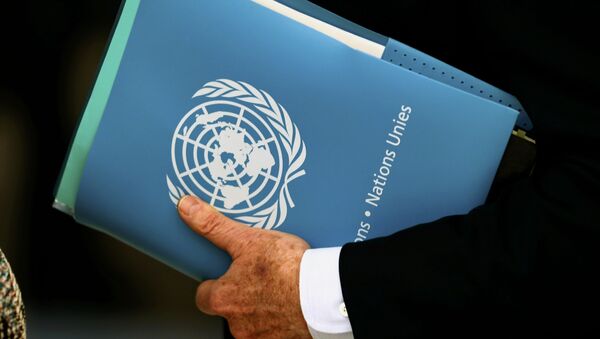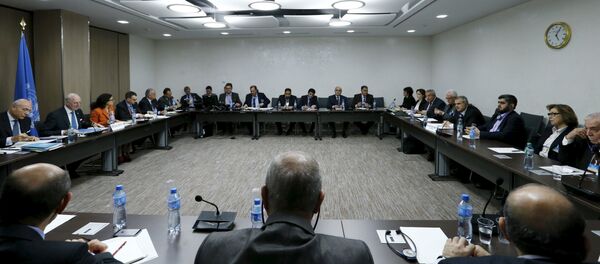WASHINGTON (Sputnik) — UN Special Envoy Staffan De Mistura’s talks in Geneva with the Syrian government and opposition parties could lead to a successful political transition and the lifting of economic sanctions, US analysts told Sputnik.
"Sanctions relief is possible," Just Foreign Policy think tank policy director Robert Naiman stated on Friday. "The Western countries are looking for some flexibility from Syria on… the question of a political transition. I have no doubt that if such flexibility emerges, it will be rewarded."
Naiman said that the ceasefire agreement, which had been strongly supported by Russia and the United States, was proving more successful and lasting than many had anticipated.
"So far, the cessation of hostilities is mostly working; the process has exceeded expectations," he noted.
De Mistura has suggested that all parties to the intra-Syria talks agree that Syria should seek the lifting of economic sanctions against it during the period of political transition, according to Thursday’s final declaration.
Western nations would have to boost humanitarian aid to help millions of refugees who fled Syria return to their homes, Naiman pointed out.
Also, Turkey would probably fail in its efforts to prevent direct Kurdish participation in the Geneva talks, since Russia and the United States both favored the idea of Kurdish involvement, Naiman added.
"I can't imagine that at the end of the day, if everything else is solved, Turkey will be able to exclude the Syrian Kurds. This is something that the United States and Russia strongly agree on," he observed.
However, many problems still needed to be solved before the warring parties in Syria could meet Russian Foreign Minister Sergei Lavrov and US Secretary of State John Kerry’s goal of a peace settlement by the end of August, Middle East historian and publisher Helena Cobban told Sputnik.
"There are important things that need to be agreed for any more formal ceasefire to stick. Perhaps the main one is that wide infiltration of Jabhat al-Nusra and affiliated units into the US-backed ‘opposition’ needs to be sorted out and somehow ended," Cobban pointed out.
Responsibility for clearing the Islamists out of the opposition forces will lie with the United States and its allies, Cobban, publisher of Just Books Publishing specializing in issues of Middle East war and peace, said.
This "is something the United States and its allies need to do and it will not be easy," she stated.
Also, the Syrian government will insist that it be a direct party to the transitional talks which Washington may oppose, or recognize as necessary, Cobban concluded.




